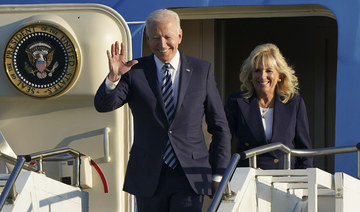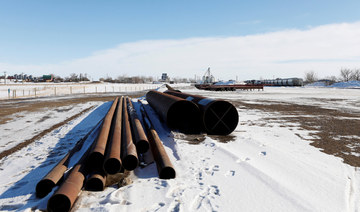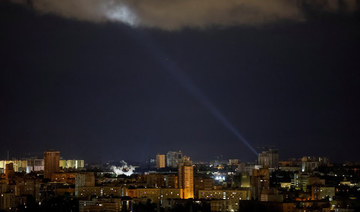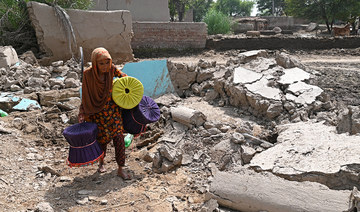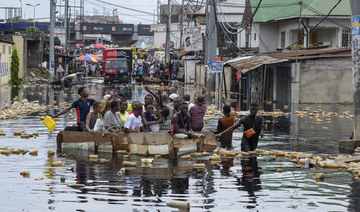MILDENHALL, England: President Joe Biden opened the first overseas trip of his term Wednesday with a declaration that “the United States is back” as he seeks to reassert the nation on the world stage and steady European allies deeply shaken by his predecessor.
Biden has set the stakes for his eight-day trip in sweeping terms, believing the West must publicly demonstrate it can compete economically with China as the world emerges from the coronavirus pandemic. It is an open repudiation of his predecessor, Donald Trump, who scorned alliances and withdrew from a global climate change agreement that Biden has since rejoined.
The president’s first stop was a visit with US troops and their families at Royal Air Force Mildenhall, where he laid out his mission for the trip.
“We’re going to make it clear that the United States is back and democracies are standing together to tackle the toughest challenges and issues that matter the most to our future,” he said. “That we’re committed to leading with strength, defending our values, and delivering for our people.”
The challenges awaiting Biden overseas were clear as the president and the audience wore masks — a reminder of the pandemic that is still raging around much of the world even as its threat recedes within the United States.
“We have to end COVID-19 not just at home — which we’re doing — but everywhere,” Biden said.
Shortly before the president spoke, people briefed on the matter said the Biden administration had brokered an agreement with Pfizer to purchase 500 million COVID-19 vaccine doses to be donated to 92 lower-income countries and the African Union over the next year.
National security adviser Jake Sullivan told reporters that Biden was committed to sharing vaccines because it was in the public health and strategic interests of the US He added that Biden is aiming to show “that democracies are the countries that can best deliver solutions for people everywhere.”
“As he said in his joint session (address), we were the ‘arsenal of democracy’ in World War II,” Sullivan said. “We’re going to be the ‘arsenal of vaccines’ over this next period to help end the pandemic.”
After addressing the troops, Biden and first lady Jill Biden flew to Cornwall Airport Newquay, then traveled by car to Tregenna Castle in St. Ives, where they are staying until Sunday.
Building toward his trip-ending summit with Russian President Vladimir Putin, Biden will aim to reassure European capitals that the United States can once again be counted on as a dependable partner to thwart Moscow’s aggression both on their eastern front and their Internet battlefields.
The trip will be far more about messaging than specific actions or deals. And the paramount priority for Biden is to convince the world that his Democratic administration is not just a fleeting deviation in the trajectory of an American foreign policy that many allies fear irrevocably drifted toward a more transactional outlook under Trump.
“The trip, at its core, will advance the fundamental thrust of Joe Biden’s foreign policy,” Sullivan said, “to rally the world’s democracies to tackle the great challenges of our time.”
Biden’s to-do list is ambitious.
In their face-to-face sit-down in Geneva, Biden wants to privately pressure Putin to end myriad provocations, including cybersecurity attacks on American businesses by Russian-based hackers, the jailing of opposition leader Alexei Navalny and repeated overt and covert efforts by the Kremlin to interfere in US elections.
Biden is also looking to rally allies on their COVID-19 response and to urge them to coalesce around a strategy to check emerging economic and national security competitor China even as the US expresses concern about Europe’s economic links to Moscow. Biden also wants to nudge outlying allies, including Australia, to make more aggressive commitments to the worldwide effort to curb global warming.
The week-plus journey is a big moment for Biden, who traveled the world for decades as vice president and as chair of the Senate Foreign Relations Committee and has now stepped off Air Force One onto international soil as commander in chief. He will face world leaders still grappling with the virus and rattled by four years of Trump’s inward-looking foreign policy and moves that strained longtime alliances as the Republican former president made overtures to strongmen.
The president first attends a summit of the Group of Seven leaders in the UK, and then visits Brussels for a NATO summit and a meeting with the heads of the European Union. The trip comes at a moment when Europeans have diminished expectations for what they can expect of US leadership on the foreign stage.
Central and Eastern Europeans are desperately hoping to bind the US more tightly to their security. Germany is looking to see the US troop presence maintained there so it doesn’t need to build up its own. France, meanwhile, has taken the tack that the US can’t be trusted as it once was and that the European Union must pursue greater strategic autonomy going forward.
“I think the concern is real that the Trumpian tendencies in the US could return full bore in the midterms or in the next presidential election,” said Alexander Vershbow, a former US diplomat and once deputy secretary general of NATO.
The sequencing of the trip is deliberate: Biden consulting with Western European allies for much of a week as a show of unity before his summit with Putin.
Biden holds a sitdown Thursday with British Prime Minster Boris Johnson a day ahead of the G-7 summit to be held above the craggy cliffs of Cornwall overlooking the Atlantic Ocean.
The most tactile of politicians, Biden has grown frustrated by the diplomacy-via-Zoom dynamics of the pandemic and has relished the ability to again have face-to-face meetings that allow him to size up and connect with world leaders. While Biden himself is a veteran statesman, many of the world leaders he will see in England, including Johnson and French President Emmanuel Macron, took office after Biden left the vice presidency. Another, Germany’s Angela Merkel, will leave office later this year.
There are several potential areas of tension. On climate change, the US is aiming to regain its credibility after Trump pulled the country back from the fight against global warming. Biden could also feel pressure on trade, an issue to which he’s yet to give much attention. And with the United States well supplied with COVID-19 vaccines yet struggling to persuade some of its own citizens to use it, leaders whose inoculation campaigns have been slower have been pressuring Biden to share more surplus around the globe.
Another central focus will be China. Biden and the other G-7 leaders will announce an infrastructure financing program for developing countries that is meant to compete directly with Beijing’s Belt-and-Road Initiative. But not every European power has viewed China in as harsh a light as Biden, who has painted the rivalry with the techno-security state as the defining competition for the 21st century.
The European Union has avoided taking as strong a stance on Beijing’s crackdown on Hong Kong’s democracy movement or treatment of Uyghur Muslims and other ethnic minorities in the western Xinjiang province as the Biden administration may like. But there are signs that Europe is willing to put greater scrutiny on Beijing.
Biden is also scheduled to meet with Turkish President Recep Tayyip Erdogan while in Brussels, a face-to-face meeting between two leaders who have had many fraught moments in their relationship over the years.
The trip finale will be Biden’s meeting with Putin.
Biden has taken a very different approach to Russia than Trump’s friendly outreach. Their sole summit, held in July 2018 in Helsinki, was marked by Trump’s refusal to side with US intelligence agencies over Putin’s denials of Russian interference in the election two years earlier.
Biden opens overseas trip declaring ‘United States is back’
https://arab.news/8qbmp
Biden opens overseas trip declaring ‘United States is back’
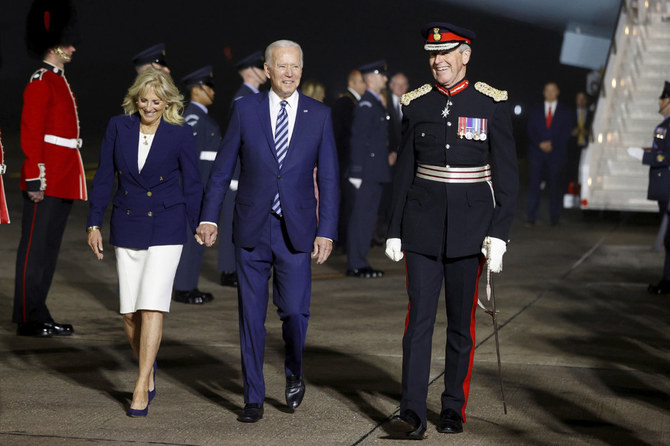
- Says the West must publicly demonstrate it can compete economically with China as the world emerges from the coronavirus pandemic
- Statement an open repudiation of Donald Trump's policy scorning alliances and withdral from a global climate change agreement
Saudi eye surgeons help 1,000 Sri Lankans regain sight

- KSrelief team consists of doctors from Saudi Arabia and Pakistan
- Untreated cataracts are the most common cause of blindness in Sri Lanka
COLOMBO: A Saudi eye surgeon team is helping 1,000 people in Sri Lanka regain sight with interventions facilitated by the King Salman Humanitarian Aid and Relief Center.
KSrelief’s Saudi Noor Volunteer Program to Combat Blindness started in the city of Kattankudy on Sri Lanka’s eastern coast on May 5 and will run through next week.
“This is a special program to combat blindness among patients who are suffering from a cataract,” M.S.M. Thassim, director general of KSrelief’s local partner, the Association of Muslim Youth of Sailan, told Arab News.
“From the total of 1,000 patients, 500 completed surgery and 500 more (surgeries) will be performed by May 16.”
Cataracts are the most common cause of blindness in Sri Lanka. Surgery to remove them is common, but government programs often require years of waiting. At private clinics, the cheapest lens replacement procedure costs about $300 — too expensive for many patients in poorer parts of the country.
“Cataracts are becoming a problem among the lower-middle class above the age of 40,” Thassim said.
“We perform cataract surgery and also give post-surgery treatment. The patients are from all parts of the island.”
The procedures are free of cost and conducted at the Kattankudy Base Hospital by Sri Lankan medics and six Saudi and Pakistani surgeons from KSrelief’s team.
One of the Saudi volunteers is Dr. Ehab Al-Sirhy, an eye surgeon from King Saud University Medical City in Riyadh.
“The amount of surgery done is an amazing number in such a short period,” he told Arab News, praising local hospital staff for their “excellent logistics and support.”
The medical campaign is part of KSrelief’s longstanding efforts to combat blindness in developing countries. Last year, the center’s team also visited Kattankudy and helped restore the vision of hundreds of patients.
“The results are very encouraging, so now everyone brings their friends and relatives, their grandmothers, their grandfathers,” Al-Sirhy said. “The (campaign’s) reputation is excellent.”
Russia claims more advances after Ukraine ground offensive

- Russia’s defense ministry said its troops had ‘liberated’ five border villages in the Kharkiv region
- The Kharkiv region has been mostly under Ukrainian control since September 2022
UKRAINE: Russia on Saturday said it had captured six villages in Ukraine’s east after launching a surprise ground offensive that prompted mass evacuations.
The defense ministry said its troops had “liberated” five villages in the Kharkiv region near the border with Russia — Borisivka, Ogirtseve, Pletenivka, Pylna and Strilecha — “as a result of offensive actions.”
The village of Keramik in the Donetsk region was also now under Russian control, it said.
Ukrainian officials said Russian forces made small advances in the area it was pushed back from nearly two years ago, the latest in a series of gains as Ukrainian forces find themselves outgunned and outmanned.
“A total of 1,775 people have been evacuated,” Kharkiv governor Oleg Synegubov wrote on social media.
He reported Russian artillery and mortar attacks on 30 settlements over the past 24 hours.
Groups of people could be seen coming in vans and cars with as many bags as they could carry at an evacuation arrival point outside the city of Kharkiv.
Evacuees — many of them elderly — registered and received food and medical assistance in makeshift tents.
“We must disrupt Russian offensive operations and return the initiative to Ukraine,” Ukrainian President Volodymyr Zelensky said on Saturday.
Ukrainska Pravda quoted military sources saying the Russian assault had resumed on Saturday near the village of Glyboke in Kharkiv.
The report could not be independently verified.

The Kharkiv region has been mostly under Ukrainian control since September 2022.
A senior Ukrainian military source said on Friday that Russian forces had advanced one kilometer into Ukraine and were trying to “create a buffer zone” in the Kharkiv and neighboring Sumy regions to prevent attacks on Russian territory.
Ukrainian forces have multiplied attacks inside Russia and Russian-held areas of Ukraine, particularly on energy infrastructure.
Moscow-installed authorities in the Russian-occupied Lugansk region in eastern Ukraine said four people were killed by a Ukrainian strike with US-made missiles on an oil depot in Rovenky.
Governor Leonid Pasechnik said the strike “enveloped the oil depot in fire and damaged surrounding homes.”
In Russia, two people were reported killed by Ukrainian strikes in the Belgorod and Kursk regions.
Ukrainian officials also reported a total of six civilians killed in Russian shelling in the Donetsk, Kharkiv and Kherson regions over the past day.
Officials in Kyiv had warned for weeks that Moscow might try to attack its northeastern border regions, pressing its advantage as Ukraine struggles with delays in Western aid and manpower shortages.
Ukraine’s military said it had deployed more troops and Zelensky said Ukrainian forces were using artillery and drones to thwart the Russian advance.
“Reserve units have been deployed to strengthen the defense in this area of the front,” it said.
The US-based Institute for the Study of War said on Friday that Russia had made “tactically significant gains.”
But the main aim of the operation was “drawing Ukrainian manpower and material from other critical sectors of the front in eastern Ukraine,” it said.
ISW said it did not appear to be “a large-scale sweeping offensive operation to envelop, encircle and seize Kharkiv” — Ukraine’s second biggest city.
Washington announced a new $400 million military aid package for Kyiv hours after the offensive began, and said it was confident Ukraine could repel any fresh Russian campaign.
Heavy rains set off flash floods in northern Afghanistan, killing at least 200 people: UN report says

ISLAMABAD: Flash floods from seasonal rains in Baghlan province in northern Afghanistan killed at least 200 people on Friday, UN report said.
The floods also caused losses to homes and property in several districts, according to Edayatullah Hamdard, the provincial director of Natural Disaster Management in Baghlan. He said that the death toll was preliminary and that it “might rise as many people are missing.”
The flash floods also hit the capital, Kabul, said Abdullah Janan Saiq, the Taliban’s spokesman for the State Ministry for Natural Disaster Management. He said that rescue teams bringing food and other aid have been dispatched to the affected areas.
Saiq said that the rescue operation is the main focus of authorities at the moment, and that he later might be able to provide more precise figures on casualties and damage.
Emergency personnel were “searching for any possible victims under the mud and rubble, with the help of security forces from the national army and police,” Hamdard said earlier.
Dozens of tents, blankets and food were provided to those who lost their homes, he added.
Video footage seen on social media showed huge torrents of muddy water swamping roads and bodies shrouded in white and black cloth.
In one video clip, children are heard crying and a group of men are looking at floodwaters, in which bits of broken wood and debris from homes can be seen.
Since mid-April, flash flooding and other floods have left about 100 people dead in 10 of Afghanistan’s provinces, with no region entirely spared, according to authorities.
Farmland has been swamped in a country where 80 percent of the more than 40 million people depend on agriculture to survive.
Rains on Friday also caused heavy damages in northeastern Badakhshan province and central Ghor province, officials said.
Taliban government spokesman Zabihullah Mujahid said authorities would provide support to those impacted by the flooding across the country.
The government “expresses its deep sympathy with the families of dead and wounded, and instructs the ministry of natural disaster management, ministries of defense and interior, and provincial authorities to spare no resource in rescue efforts,” he said in a statement on X, formerly Twitter.
Mohammad Akram Akbari, the provincial director of natural disaster management in Badakhshan, said the mountainous province had seen “heavy financial losses in several areas... due to floods.”
He added that casualties were feared in Tishkan district, where flooding had blocked a road and cut off access to an area where some 20,000 people lived.
Afghanistan — which had a relatively dry winter, making it more difficult for the soil to absorb rainfall — is highly vulnerable to climate change.
In April, at least 70 people died from heavy rains and flash flooding in the country. About 2,000 homes, three mosques, and four schools were damaged last month. Thousands of people require humanitarian assistance. The flooding also damaged agriculture land and 2,500 animals died in the deluges, according to Saiq.
The nation, ravaged by four decades of war, is one of the poorest in the world and, according to scientists, one of the worst prepared to face the consequences of global warming.
Afghanistan, which is responsible for only 0.06 percent of the world’s greenhouse gas emissions, ranks sixth on the list of countries most at risk from climate change, experts say.
Half of Afghanistan’s population lives under the poverty line, and 15 million people are experiencing food insecurity, according to the World Bank.
Police arrest dozens as they break up pro-Palestinian protests at several US universities

- Israel has killed more than 34,700 Palestinians, according to Gaza’s Health Ministry
- Nearly 2,900 people have been arrested at 57 colleges and universities
NEW YORK: Police made dozens of arrests as pro-Palestinian protest encampments were dismantled Friday at the University of Pennsylvania and the Massachusetts Institute of Technology, hours after police tear-gassed demonstrators and took down a similar camp at the University of Arizona.
Philadelphia and campus police at Penn took action around daybreak to remove protesters from an encampment in place for more than two weeks. School officials said protesters were given warnings and the chance to leave without being detained. About 33 people, including faculty members and seven students, were among those arrested and charged with trespass, the school said.
Protest camps have sprung up across the US and in Europe in recent weeks as students demand their universities stop doing business with Israel or companies that support its war efforts. Organizers seek to amplify calls to end Israel’s war against Hamas in Gaza, which they describe as a genocide against the Palestinians. The top United Nations court has concluded there is a “plausible risk of genocide” in Gaza — a charge Israel strongly denies.
In Cambridge, Massachusetts, police in riot gear arrived at MIT around 4 a.m., encircled the camp and gave protesters about 15 minutes to leave. Ten students who remained were arrested, the university’s president said. A crowd outside the camp began chanting pro-Palestinian slogans but was quickly dispersed.
At the University of Arizona in Tucson, campus police in riot gear fired tear gas at protesters late Thursday — the day before the school’s main commencement ceremony — before tearing down an encampment that included wood and plastic barriers. The school said police vehicles were spiked, and rocks and water bottles were thrown at officers and university staff. Two people were arrested, a university spokesperson said. Friday night’s commencement will go forward, university President Robert Robbins said.
And at New Mexico State University in Las Cruces, police arrested 13 people Thursday night after they refused to leave a damaged and vandalized building. The charges ranged from misdemeanor trespass to felonies including battery on a peace officer, school spokesperson Amanda Bradford said. The building, Hadley Hall, was cleared and open Friday.
Protesters at the University of Wisconsin-Madison agreed Friday to permanently dismantle their 2-week-old encampment and not disrupt graduation ceremonies this weekend, in return for the opportunity to connect with “decision-makers” who control university investments by July 1. The university agreed to increase support for scholars and students affected by wars in Gaza and Ukraine.
Graduates from Pomona College in Southern California will have to travel 40 miles (65 km) for their commencement ceremony Sunday, as administrators seek to avoid a current encampment. The college said it will provide transportation to the venue, a historic theater in Los Angeles. In April, protesters entered an administration building and police arrested 20 people.
The protest movement began nearly three weeks ago at Columbia University in New York City. Some colleges nationwide cracked down immediately, while others tolerated the demonstrations. Some recently started calling in the police, citing concerns about disruptions to campus life and safety.
The Associated Press has recorded at least 75 instances since April 18 in which arrests were made at US campus protests. Nearly 2,900 people have been arrested at 57 colleges and universities. The figures are based on AP reporting and statements from schools and law enforcement agencies.
Arizona State University on Friday confirmed that it had placed its campus police chief on paid administrative leave pending a review of “complaints filed related to his actions” two weeks ago when an encampment was removed and police made more than 70 arrests during a pro-Palestine rally on the campus in Tempe.
The school said it was reviewing actions surrounding the establishment and removal of the encampment. Local news outlets reported earlier that ASU Police Chief Michael Thompson had been placed on leave after he had been seen out of uniform cutting and removing tents during the protest. The school told ABC15 Arizona earlier he had left a meeting to respond to the rally.
Although their encampment was cleared after two weeks, demonstrators at George Washington University vowed Friday to keep up their protest campaign.
Police arrested 33 people on Wednesday while ousting the initial encampment. The next night, a crowd of chanting demonstrators returned to the university about five blocks from the White House, setting up tents while a large Metropolitan Police Department force assembled. After multiple warnings to disperse, protests leaders ended the demonstration around midnight. One person was arrested for throwing water at a police officer.
The move at MIT came several days after police first attempted to clear the camp, only to see protesters storm past barriers and restore the encampment, which includes about a dozen tents in the heart of the campus in Cambridge.
Before removing the encampment, MIT earlier in the week started suspending dozens of students, meaning they’re barred from academic activities or commencement.
Protesters insist they will keep demanding MIT cut all ties to the Israeli military. The encampment was up for weeks and especially angered Jewish students, who held counterprotests nearby.
“This is only going to make us stronger. They can’t arrest the movement,” said Quinn Perian, an undergraduate student and organizer for MIT Jews for Ceasefire. “MIT would rather arrest and suspend some students than they would end their complicity with the genocide going in Gaza.”
MIT President Sally Kornbluth, in a letter confirming Friday’s arrests, wrote that her responsibility is “to make sure that the campus is physically safe and functioning for everyone ... and that everyone feels free to express their views.” The encampment, she wrote, “increasingly made it impossible to meet all these obligations.”
South Africa again requests emergency measures from world court to restrain Israel’s actions in Gaza
South Africa again requests emergency measures from world court to restrain Israel’s actions in Gaza

- The North African country joins Nicaragua and Colombia, which have filed their own requests to take part in the proceedings
- Israel has killed more than 34,700 Palestinians in Gaza, mostly women and children, according to the health ministry in the Hamas-run territory
THE HAGUE, Netherlands: South Africa urged the United Nations’ top court Friday to issue more emergency measures to restrain Israel, saying its military incursion in Rafah threatens the “very survival of Palestinians in Gaza.”
The request marks the fourth for additional measures by South Africa, which filed a genocide case against Israel late last year at the International Court of Justice. According to the latest request, the previous preliminary orders by The Hague-based court were not sufficient to address “a brutal military attack on the sole remaining refuge for the people of Gaza.”
At hearings in January, lawyers for Israel argued that its war in Gaza was a legitimate defense of its people and that it was Hamas militants who were guilty of genocide.
South Africa has asked the court to order Israel to withdraw from Rafah; to take measures to ensure unimpeded access to UN officials, humanitarian organizations and journalists to the Gaza Strip; and to report back within one week as to how it is meeting these demands.
Earlier this week, Israel issued a warning to evacuate an area of eastern Rafah where approximately 100,000 Palestinians have been sheltering. Israeli military forces have now seized the nearby border crossing with Egypt, leaving all entries and exits from the beleaguered enclave under Israeli control.
South Africa also accused Israel of violating the previous provisional measures imposed by the court. In January, judges ordered Israel to do all it could to prevent death, destruction and any acts of genocide in Gaza. Two months later, the court issued a second set of measures, telling Israel to improve the humanitarian situation, including opening more land crossings to allow food, water, fuel and other supplies.
The court also announced on Friday that Libya had asked to join the case and intervene in support of South Africa. The North African country joins Nicaragua and Colombia, which have filed their own requests to take part in the proceedings.
Separately, Nicaragua brought a complaint against Germany, arguing the European country is enabling genocide by sending arms and other support to Israel. Earlier this month, the court rejected a request for emergency measures against Berlin, but the case will continue on merits.
The war began with a Hamas attack on southern Israel on Oct. 7 in which Palestinian militants killed around 1,200 people and took about 250 hostages. The attack sparked an Israeli invasion the Gaza Strip, home to 2.3 million people.
Israel’s bombardment and ground offensives in Gaza have killed more than 34,800 Palestinians, mostly women and children, according to the Gaza Health Ministry, which does not distinguish between civilians and combatants in its figures. Much of Gaza has been destroyed and some 80 percent of Gaza’s population has been driven from their homes.
The UN says northern Gaza is already in a state of “full-blown famine.”



